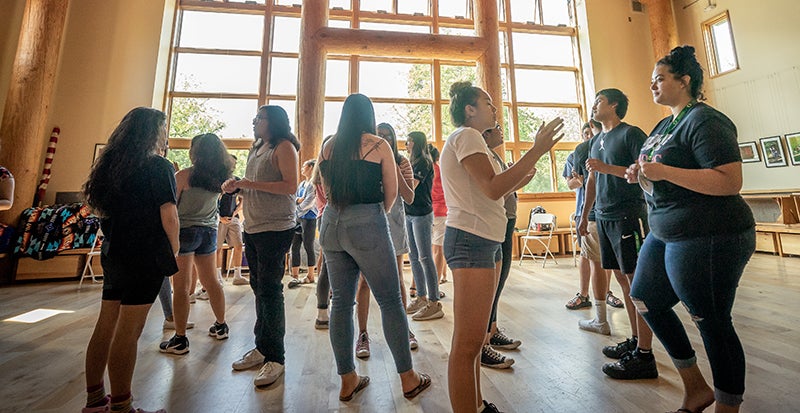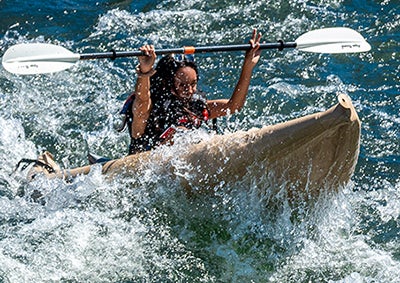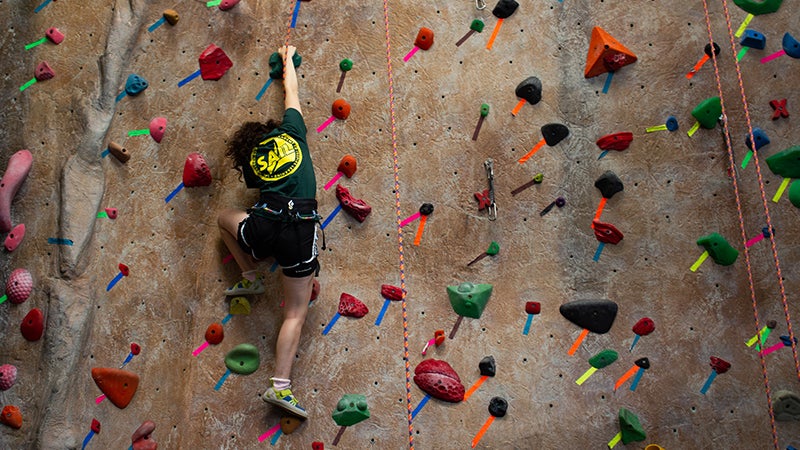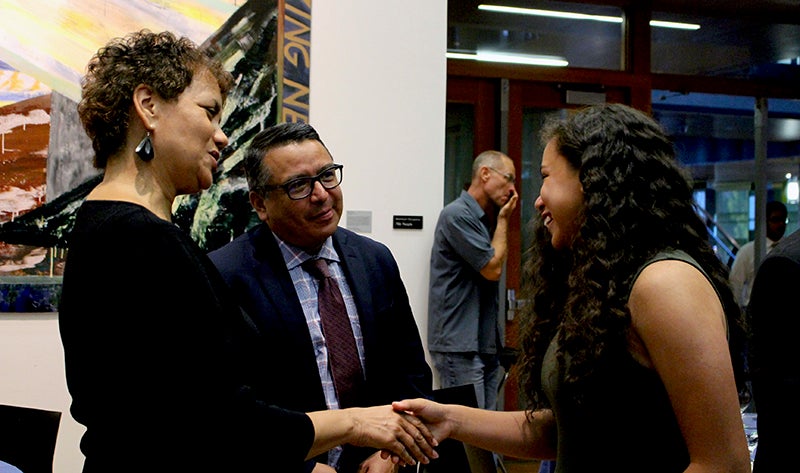Bridge programs offer tomorrow’s Ducks a taste of college life
If Amazon doesn't have a Whole Foods grocery near you, there are non-perishable groceries ( food that doesn't spoil) that Amazon can ship to you

Most students are gone for the summer, but many future Ducks from middle and high schools across Oregon and neighboring states are here experiencing what college is like through UO bridge programs and summer college visits.
Free residential programs offer these Ducklings a chance to take daily classes, from economics to theater, global cultures to biology, music recording to writing, and even a chance to learn physics through rock climbing.
Students also get time to build social bonds, develop cultural and identity pride, practice team-building, improve their networking skills and even learn which fork to use at a formal business dinner.
Through these summer programs and visits, the UO affirms its commitment to provide support so all Oregon youth can pursue a college education, become active and well-rounded citizens and embrace their unique heritages and communities.
Supporting and recognizing a diversity of cultures is part of the essential fabric that creates a vibrant UO and Oregon. They also give youth from neighboring states and beyond a chance to see what the UO and Oregon can offer.
Anyone on campus this summer may bump into these young students in the Jordan Schnitzer Museum of Art, Mac Court or other campus sites as they explore the UO. They might even provide a food review, as they are living in UO housing to experience dorm life and food.
Indigenous Pre-College Academy
 The Indigenous Pre-College Academy, known on campus by its acronym IPCA, works to empower and educate the next generation of native scholars.
The Indigenous Pre-College Academy, known on campus by its acronym IPCA, works to empower and educate the next generation of native scholars.
The program, in its second year, creates a cohort of college-bound indigenous students by helping prepare them for college and offering them a chance to meet peers from around the state and beyond. This summer’s program drew 21 participants from 10 states and 21 tribal nations.
IPCA serves middle and high school students who are Native American, Alaska Native, Native Hawaiian, Pacific Islander and self-identifying indigenous students.
“I almost considered not going to the Indigenous Pre-College Academy out of fear and insecurity, but my life was altered in so many ways. Everyone made me feel like I truly belonged somewhere, and taught me so much. I’ll remember the experience and everyone forever.” — IPCA participant Kennedy Cox, a North Carolina Lumbee and Waccamaw
The program offers a variety of academic classes and helps students find their passion. Students also get help with the nuts and bolts of college admissions and financial aid and planning for their academic pursuits.
 Essential to the program is an emphasis on indigenous identity, cultural knowledge and traditions that help maintain a student’s culture while they are pursuing higher education, organizing and pursuing activism.
Essential to the program is an emphasis on indigenous identity, cultural knowledge and traditions that help maintain a student’s culture while they are pursuing higher education, organizing and pursuing activism.
“I wish I had experienced a program like IPCA where I was able to learn how to balance navigating learning institutions and my indigenous identity. Helping 20-plus students learn about this over the course of a week has been rewarding, along with kayaking — that was my other highlight of the week,” said UO student Sonara Malumaleumu, an IPCA counselor and a member of the Confederated Tribes of The Umatilla Indian Reservation and Walker River Paiute.
Summer Academy to Inspire Learning
Widely known as SAIL, the Summer Academy to Inspire Learning encourages students to enroll and succeed in college through early exposure and exploration. The program serves middle and high school students from underrepresented backgrounds. Priority is given to students traveling to campus from 30 miles or further.
Students choose from an array of subjects and learn from distinguished UO faculty members through social and interactive activities. Students are offered nitty-gritty info on college admissions, scholarships and financial aid. They also are introduced to various activities, ranging from a night in Eugene to a Samba Ja concert.
During the regular school year, UO students administer a mentoring program, described here in a video, for SAIL students.
The program also offers nonresidential summer programs.
Former SAIL participant Sheyla Martinez-Bautista, now a program staff co-leader, said her experience really helped her chart her course.
“Seeing how much people actually believed in me and supported me made me realize that I was worth going to college and that all the negative things that I thought about myself and that people thought about me weren’t true,” she said. “I don’t think I would have seen that or be comfortable be on this campus without this program.”

Oregon Young Scholars Program
The Oregon Young Scholars Program, or OYSP, works to develop academic and college prep skills and helps prepare students to be active members and leaders of their communities. The program serves middle and high school students from Eugene-Springfield, Salem and Portland schools who are most underserved in higher education.
“The program helped me on a personal and academic level. The family I built with people in the program is invaluable, and the help I’ve been offered in terms of school is the only reason I continued on to college.” — UO junior Gweneth Wolfe, a former OYSP participant who now helps the program through a student job with the Division of Equity and Inclusion
 The program offers academic, social, community and cultural activities. Various groups in the program focus on a range of subjects, from architecture to neuroscience to theater arts to peace jam, as well as workshops on essentials of the college process, including financial aid.
The program offers academic, social, community and cultural activities. Various groups in the program focus on a range of subjects, from architecture to neuroscience to theater arts to peace jam, as well as workshops on essentials of the college process, including financial aid.
A field trip to the coast, community networking dinner, talent show and a program-ending presentation for families were part of this year’s program. OYSP continues during the school year with tutors, college prep and well-being checkups.
This year, 11 potential future Ducklings from Los Angeles attended OYSP as a collaboration with the nonprofit organization Partnership for Los Angeles Schools and its Lundquist Fellows program.
At the program’s community networking dinner, one of this summer’s program highlights, the sounds of activity were loud, fast and furious as participating students talked and interacted with community members about their strengths, dreams and challenges. And as those interactions occurred, the students handed out their own business cards.
This year’s students were joined by SAIL participants and nearly 50 UO and Eugene-Springfield community professionals and business owners, including Gustavo Balderas, superintendent of Eugene School District; Debbie Lomax, owner of Ron’s Island Grill & Rock Gym; Eugene City Manager Jon Ruiz; and Kevin Marbury, UO vice president for student life.
Residential programs are not the only approach
A lot of nonresidential programs also bring future Ducks to the UO campus.
Among the programs offered this summer was the Science Program to Inspire Creativity and Excellence, or SPICE, which each year introduces a new generation of girls to the world of scientific inquiry.
SPICE is a two-week program for girls from middle and high school so that they will thrive in science, technology, engineering and mathematics, the STEM fields.
Out of town? Come on down. Not only Oregonians are on campus, and not all come through structured programs.
Twelve African American high school students from Washington state took a “college road trip” to the UO through the nonprofit youth organization, iDayDream: Inspiring Youth to Dream Out Loud.
Students met with advisors and faculty members, attended workshops and toured campus. Of course, they posed with the Duck in front of the Ford Alumni Center. One student has already submitted her resume to the UO for future student job possibilities.
The UO is helping to create tomorrow’s Ducks and tomorrow’s Oregonians. Give them a warm UO welcome and make sure to get their business cards so you can say you knew them when.
—By tova stabin, University Communications


 College Dorm and Apartment Cooking gadgets - if you change the sort settings on the Amazon page, it will show other items by price
College Dorm and Apartment Cooking gadgets - if you change the sort settings on the Amazon page, it will show other items by price

Source link

















